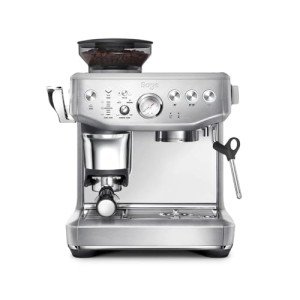5 Lessons You Can Learn From Home Espresso Machines
The Rise of Home Espresso Machines: A Comprehensive Guide
As coffee lovers continue to look for fresh and delicious brews in your home, the popularity of home espresso machines has actually surged in the last few years. No longer simply the domain of coffee shops and coffee stores, these machines empower people to craft barista-quality espresso beverages from the convenience of their kitchens. This article will explore the various kinds of home espresso machines, their functions, and considerations for choosing the right one. Additionally, it will supply a selection of FAQs to assist potential buyers make notified choices.
Kinds Of Home Espresso Machines
Home espresso machines can be classified into several classifications based upon their systems and user-friendliness. Each type has its special functions, pros, and cons.
Type
Description
Pros
Cons
Manual Espresso Machines
Requires the user to manually control the brewing process, including techniques like pulling a lever to create pressure.
- Complete control over brewing procedure
- Compact design
- Requires ability and practice
- Time-consuming
Semi-Automatic Machines
Machine automates water flow and pressure, however the user still manages the dosing and period of the brewing procedure.
- Balance of automation and control
- Versatile
- Learning curve for perfecting techniques
Completely Automatic Machines
Automates the entire brewing process, from grinding to developing, often with programmable settings for personalized beverages.
- Extremely easy to use
- Quick and convenient
- Less control over the brewing process
- Higher price point
Pill or Pod Machines
Utilizes pre-packaged espresso capsules or pods to produce coffee quickly and easily.
- Extremely simple to use
- Minimal clean-up
- Limited taste variety
- More pricey per cup than ground coffee
Super-Automatic Machines
Integrates functions of completely automatic machines with built-in grinders, allowing users to brew entire bean espresso and milk-based beverages with one touch.
- All-in-one convenience
- Ideal for milk-based drinks
- Often the most expensive
- Can be large
Features to Consider
When choosing a home espresso machine, prospective purchasers must consider the following functions to ensure they choose a machine that meets their needs:
Grinder Type:
- Built-in grinders can supply fresher grounds but might need more maintenance.
- Separate grinders permit more customization of grind size.
Pressure:
- Look for machines that produce at least 9 bars of pressure, which is optimum for brewing espresso.
Water Temperature Control:
- Machines with adjustable temperature level settings enable better extraction of flavor from beans.
Milk Frothing Options:
- Consider whether you desire a manual steam wand for frothing or an automatic milk frother for benefit.
Relieve of Cleaning:
- Machines with detachable parts and self-cleaning functions significantly reduce cleanup time.
Size and Design:
- Ensure the machine fits easily in your cooking area and lines up with your visual choices.
Budget:
- Set a budget before beginning your search, as rates can range substantially from affordable models to high-end machines.
Advantages of Home Espresso Machines
Owning a home espresso machine offers various benefits:
- Cost-Effective: Over time, brewing espresso in your home can save coffee lovers cash compared to regular café check outs.
- Customization: Users can try out various beans, grind sizes, and brewing methods to discover their perfect cup.
- Convenience: The ability to brew espresso at any time eliminates the requirement to head out to a café, specifically useful throughout late nights or mornings.
- Quality assurance: With a home machine, people have total control over the quality of components and developing processes.
Drawbacks of Home Espresso Machines
However, there are some disadvantages to think about:
- Initial Investment: High-quality espresso machines can be costly, requiring a considerable upfront investment.
- Knowing Curve: Mastering the art of espresso developing can take time and practice, which may be daunting for newbies.
- Maintenance: Like any device, espresso machines require routine cleansing and maintenance to make sure optimal efficiency.
FAQs
1. What is the very best kind of home espresso machine for beginners?
Answer: For novices, a semi-automatic machine is frequently advised as it uses a balance between control and automation, permitting you to learn the essentials without frustrating complexity.
2. How much should I invest in a home espresso machine?
Answer: Entry-level machines can start around ₤ 100 to ₤ 300, while higher-end models can vary from ₤ 500 to over ₤ 2000. It's necessary to set a budget based on your anticipated usage and desired functions.
3. Do Affordable Espresso Machines need a different grinder?
Response: While some espresso machines include integrated grinders, purchasing a different grinder permits higher customization and makes sure better quality grounds.
4. How typically should I clean my espresso machine?
Answer: Cleaning frequency can differ by machine type, but it's typically recommended to clean the machine after each use and perform deep cleansings weekly or regular monthly, depending upon usage.
5. Can I make milk-based beverages with any espresso machine?
Response: Not all machines feature milk frothing abilities. If you enjoy drinks like lattes or coffees, try to find a machine with a steam wand or automatic frother.
Home espresso machines are changing the way coffee enthusiasts enjoy their precious brews. With numerous types and advanced functions offered in the market, there is something for everybody. Whether it's the joy of developing distinct dishes or simply enjoying the perfect shot of espresso, purchasing a home espresso machine can enhance both the coffee-drinking experience and the lifestyle for coffee enthusiasts everywhere. Similar to any investment, it is important to weigh the advantages against the potential downsides and select a machine that perfectly fits both your way of life and preferences.
